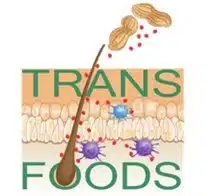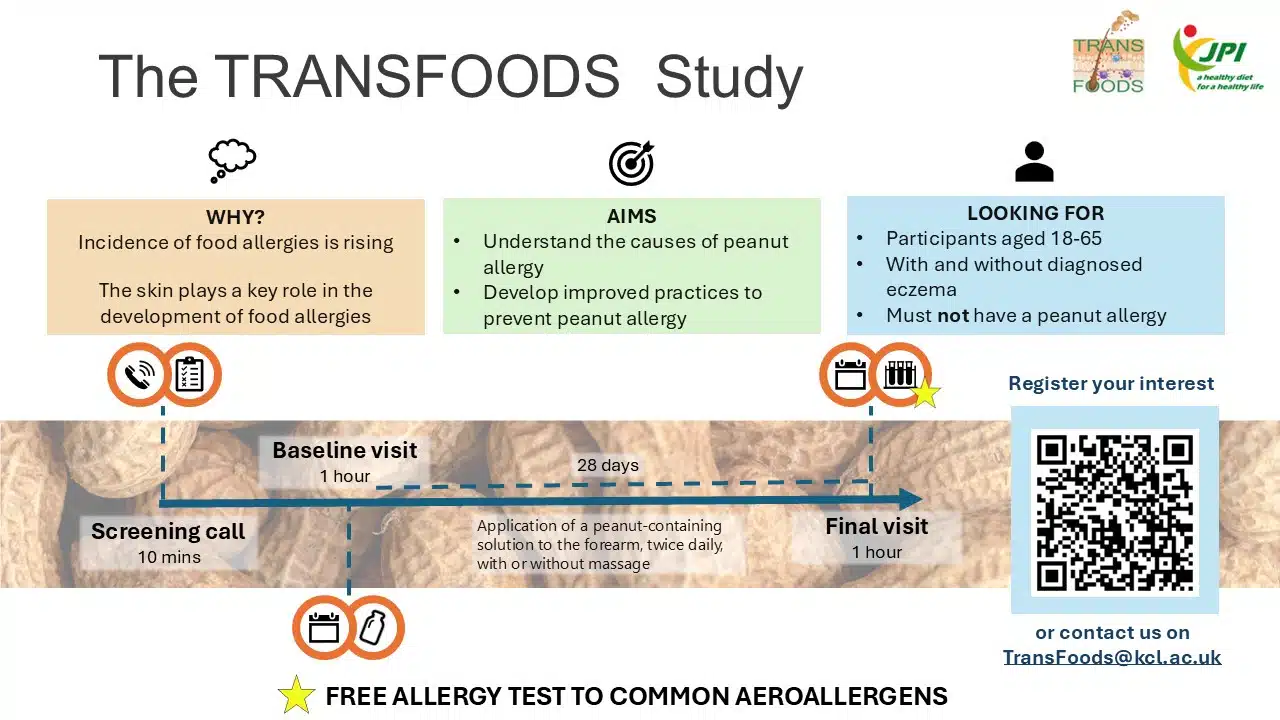
Allergic diseases, including atopic eczema, and food allergies affect over a quarter of all children across Europe. The way the immune system responds to ingested foods is now well-established. We know that regular eating of allergy-causing foods can prevent food allergies to a degree. However, recent research has shown that food allergies can develop through the skin, especially in babies’ with dry skin and eczema. Unfortunately, we do not fully understand how this happens at the moment.
The aim of the TRANS-FOOD study is to reduce the risk of babies developing peanut allergy through skin contact by:
- Understanding the mechanisms through which this occurs;
- Adapting skin care practices. And also through modifications of the way peanut snacks are manufactured. This will help reduce the load of peanut protein in the environment.
The TRANS-FOOD Study is an international collaboration. The TRANS-FOOD Study has leaders in their respective fields from the UK, Germany, and France. These researchers are actively investigating the effects of food processing on the solubility of peanut protein and its components in oil, and how this relates to skin exposure to peanut protein. Also, they will examine the effect of peanut protein skin contamination. They will be looking at immune system activation induced by massage, as well as peanut exposure to the skin, in volunteers with dry skin and/or eczema. Their findings will be translated into actions through working with an industrial peanut processing partner, patients and consumers.
The research team is actively working with the food industry, the National Eczema Society and Allergy UK, as well as other national and international food standards agencies. This will ensure stakeholder awareness, and importantly that the research findings are translated into improved public health measures, and ultimately prevent peanut allergy.
For more information contact: transfoods@kcl.ac.uk
Adult Volunteers Needed!
The TRANS-FOODS Study is actively seeking adult volunteers, with or without eczema, for their peanut allergy research study. This is an important new research project looking into how peanut allergy might develop through skin contact.
The Trans-Foods research project is looking at how food allergies develop through the skin, and how adapting skincare practices can help. The project is led by Professor Carsten Flohr, Consultant Dermatologist at St John’s Institute of Dermatology at King’s College London and Guy’s and St Thomas’ NHS Foundation Trust.
Professor Flohr told us: ‘We are very excited to be working with the National Eczema Society on this international project. The project is bringing together experts from the UK, Germany and France to study the effects of food processing upon the solubility of peanut protein and its components in oil, and how this relates to skin exposure to peanut protein. Immune system activation induced by massage and peanut exposure to the skin is also being studied in volunteers with dry skin and/or eczema.’
The TRANS-FOODS research team is recruiting adult volunteers to take part in the study. For your time, you will be offered free allergy testing to common aeroallergens.
We believe the skin could be a key route through which food allergies develop. We are looking to recruit participants, aged 18-65, with and without diagnosed eczema, who do NOT have a peanut allergy.
📅 Time Commitment
1x screening call ~approximately 10 mins.
2x 1-1.5 hour visits, 28 days apart.
- Everyone will apply an oily peanut-containing preparation to their outer forearm, twice daily, with or without massage, over 4 weeks.
- Some participants will also apply sun cream (provided by us) to the same area.
What’s in it for you?
A free allergy test will be performed during your second visit. You will be tested for a peanut allergy and aeroallergens = house dust mite, tree and grass pollen, cat, dog and horse.

If you are interested and would like further information, please email the TRANS-FOODS research team on TransFoods@kcl.ac.uk
